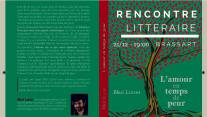
The Pagan Rabbi and Other Stories by Cynthia Ozick. 270 pp. Knopf, 1971.
Cynthia Ozick’s ear for the vernacular cadences of Jewish-American English is equal to the great writers of her generation. Like Saul Bellow, Grace Paley, and Philip Roth, she writes dialogue that seems to leap from the page and grab you by the shirt. She can be as funny as those masters, too, but otherwise Ozick goes her own way. She’s a challenging and cerebral writer intensely engaged with Jewish identity, history, and mythology.
Ozick’s first story was published in the journal Prairie Schooner in 1956. Her first collection, The Pagan Rabbi (1971), doesn’t reach back quite that far. Most of these seven longish stories were first published in periodicals between 1966 and 1971, with a concentration of activity at the turn of the decade. Her prose is always a delight, but among a couple of unqualified successes several stories seem slightly suffocated in the fusty air of their historical-mythological inspirations.
‘Envy, or Yiddish in America’ is the masterpiece of the collection. It recounts a point of crisis in the life of Hershele Edelshtein, a 67-year-old widower, an obscure poet, who doggedly, provincially, even quixotically equates Jewish culture almost exclusively with the Yiddish language. After forty years in America, he resents the “puerile, vicious, pitiable, ignorant, contemptible, above all stupid” younger American novelists defining Jewishness for the contemporary world. He reads them ravenously. Edelshtein has always been a provincial who never saw the great European capitals — “for him Western Civilization was a sore point,” Ozick writes with a particularly Bellovian cadence. Western Civilization is a “pod of muck.”
After the genocide of Europe’s Jews and the adoption of Hebrew in the new state of Israel, Yiddish literature is dying — “lost, murdered”. It is a loss unique to history:
Of what other language can it be said that it died a sudden and definite death, in a given decade, on a given piece of soil? Where are the speakers of Ancient Etruscan? Who was the last man to write a poem in Linear B? Attrition, assimilation. Death by mystery not gas.
Edelshtein contributes poems to his friend Baumzweig’s biannual Bitterer Yam (Bitter Sea), a Yiddish language journal that is forgotten and almost without subscribers, enduring only because of the philanthropic bequest of some long-dead laxative manufacturer. Poor Edelshtein earns a meagre living as a lecturer on the death of Yiddish literature to synagogues and community centres. Here we are on the pathetic fringe of the poetry world, and the Yiddish fringe at that — a double whammy of obscurity. Roberto Bolaño would have liked this milieu.
By now the only shot at writerly immortality — even writerly recognition — is English translation. The only translated Yiddish writer is Yankel Ostrover (clearly inspired by Isaac Bashevis Singer), the man who once cuckolded Edelstein. Ostrover is celebrated and feted by Americans for his stories of a fictional Polish shtetl. Edelshtein and Baumzweig, ageing Yiddishists, are united by their jealous hatred for a man they call ‘Pig’ for his white skin that appears like “a tissue of pale ham.”
Edelshtein writes to Ostrover’s New York publishers to attack their star author as well as beg for a translator. The publishers pass on the opportunity because “reputation must precede translation.” That smarts, and Edelshtein fires off a riposte to these “Jews without tongues.” Next Edelshtein tries to persuade some of Ostrover’s put-upon translators to take up his cause. One rejects him with a hilarious letter describing the thankless and ill-paid work of the translator. She writes of a gruelling session with Ostrover and his meddling wife as they struggle to come up with a more idiomatic word for ‘big.’ “We go through huge, vast, gigantic, enormous, gargantuan, monstrous, etc., etc., etc., and finally Ostrover says — by now it’s five hours later, my tonsils hurt, I can hardly stand — ‘all right, so let it be “big”. Simplicity above all.’”
Ozick must have had the inside dope on Singer’s methods. Lester Goran, one of Singer’s translators in the 1980s, told me how their work sessions would sometimes remind him of the fate of the man forced to read aloud to his captor in Evelyn Waugh’s ‘The Man Who Liked Dickens’. “I often felt like I was being held prisoner by Isaac,” Lester told me. “We would finish up and I would be stunned. My ears would be ringing with boredom.”
Edelstein may be a mediocre poet with an inflated sense of self-worth, but to his credit he checks his self-pity. After all, what is his dilemma in the scheme of his people’s suffering? He carries the burden of survivor guilt. He is a man who has lost everything, including the eyes and ears of his people. His crisis turns ugly as he pursues a young Jewish woman who knows one of his poems. Will she translate for him?
Not all of the stories in The Pagan Rabbi unite Ozick’s cerebral exploration of Jewish life with such zest, humour, and moving tenderness. At times she jumps into the downright bizarre. Remember Alexander Portnoy’s exasperation at his parents’ extreme naivety, their scepticism that “there are women who are homosexual persons”? “Momma! Poppa!” Portnoy cries. “There are people who fuck chickens!” Well, in title story of her collection Ozick gives us a rabbi who fucks a tree. I am not sure how this subject could ever be the basis for anything but bawdy comedy, but Ozick plays it straight. Or maybe I just missed the joke. Obsessed with ‘free souls’, a rabbi goes madly pagan in a public park, copulating with a tree who appears to him as a dryad. She helps him separate his soul from his body and he hangs himself. The rabbi’s dense letter of romantic mythopoeic pedantry is quoted at length.
‘The Dock-Witch’ is another metamorphosis story about a woman emerging from wood — in this case the lyre-strumming figurehead on a ship’s prow. The narrator is a young man from Ohio, a former landlubber now living in New York. His provincial kin frequently pass through the city on their way to the port to take superficial European vacations. The man-destroying siren who hangs around the docks sets her sights on him.
The main character of ‘The Suitcase’, a very finely constructed short story, is Gottfried Hencke, a former WWI air force pilot for the Kaiser, a German long-resident in America. The setting is New York, Hencke’s son’s self-funded art exhibition. Gottfried Jr. has a rich and stupid gentile wife as well as a Jewish mistress, Genevieve. Hencke is at pains to insist he admires Genevieve even if she relentlessly provokes him with suggestions he is a Nazi sympathizer. He rejects any culpability for the Holocaust. He wasn’t there. “Who could be blamed for history?” he thinks. Hencke is haunted by the thought of his sister’s eleven year old daughter, killed by Allied bombing. But finally, desperate to prove his innocence in the surprise theft of Genevieve’s pocketbook, Hencke opens his suitcase and exposes his underwear, even though he has not even been accused of the crime.
Ozick has subsequently published another five collections of short stories. For some reason her Collected Stories, which rounds up everything to 2006, has only ever been published in the UK. In The Pagan Rabbi we meet a still-maturing writer, with one long novel already to her credit (Trust, 1966), sketching a preliminary map of what would become her terrain.
Edinburgh, November 2017
Advertisements Share this:





